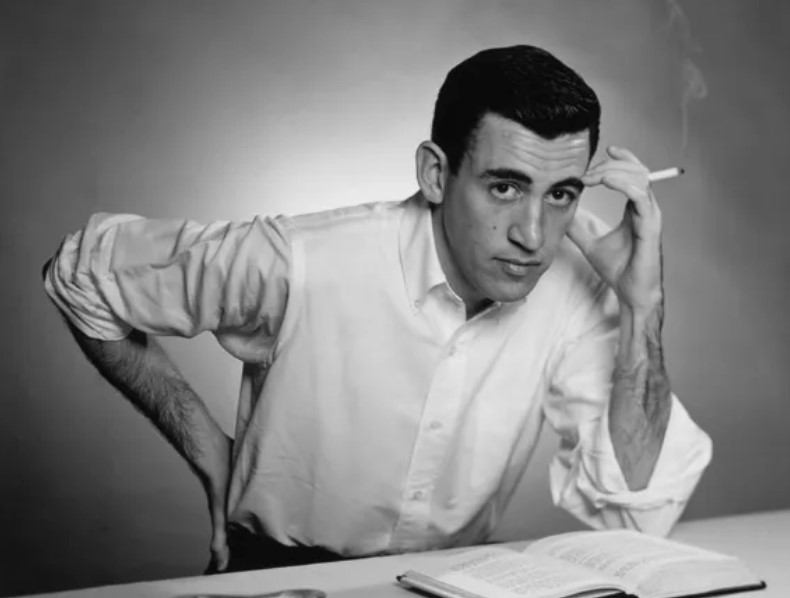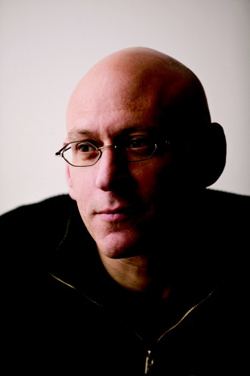(This is the thirty-seventh entry in the The Modern Library Reading Challenge, an ambitious project to read the entire Modern Library from #100 to #1. Previous entry: A Clockwork Orange.)
 Like many semi-literate members of my generation, I first read The Catcher in the Rye at the age of fifteen, following the ethereal rites and cadences of older kids turned on by the same seductive anthem to nonconformity. At that angsty teenage time in my life, Holden Caulfield appealed to my rebellious and anti-authoritarian streak. This reaction, in and of itself, is not especially unusual. Salinger has continued to be assigned to high school English curricula in large part because you can inveigle kids into reading by making the titles forbidden. (Witness how Art Spiegelman’s Maus became a surprise bestseller last year after some boneheaded martinets banned the evocative Holocaust graphic novel from Tenneessee school libraries.)
Like many semi-literate members of my generation, I first read The Catcher in the Rye at the age of fifteen, following the ethereal rites and cadences of older kids turned on by the same seductive anthem to nonconformity. At that angsty teenage time in my life, Holden Caulfield appealed to my rebellious and anti-authoritarian streak. This reaction, in and of itself, is not especially unusual. Salinger has continued to be assigned to high school English curricula in large part because you can inveigle kids into reading by making the titles forbidden. (Witness how Art Spiegelman’s Maus became a surprise bestseller last year after some boneheaded martinets banned the evocative Holocaust graphic novel from Tenneessee school libraries.)
I am now in my late forties and I still remain as iconoclastic and as boundary-pushing (though a tad less loutish) as I was when I was a mere stripling, although I’d like to think that my temperament has been made more palatable by my greater commitment to pragmatism. In that intervening time I avoided rereading Catcher until last year, dreading the disagreeable revisitation when this classic at long last emerged on this insanely ambitious project like some former crush at the twenty year high school reunion inviting you to a hotel room after spilling the tatters of her doomed marriage. You instinctively know that you’re better off chatting up some comely and perspicacious stranger at the hotel bar, someone without a loose thread dangling from a varsity sweater in mothballs. Because who you were when you knew nothing is quite different from the middle-aged person you are now who knows slightly more than nothing. There’s enough cognizance in the tank to suggest that a freeform hookup consummated long after your adolescent lust has shriveled up is a very bad idea. Particularly one in which you aid and abet nuptial dissolution by your own selfish spasms.
And while I will stand by most of Salinger’s Nine Stories and, in particular, the far more interesting thoughts of the precocious Glass family (I’m even willing to stump a bit for the problematic “Hapworth 16, 1924,” which is far more interesting in its uncompromising stance than anything gurgling from Holden Caulfield’s mouth), I can no longer hold up The Catcher in the Rye as great literature — not that it was ever really my goto choice. (James Baldwin, James M. Cain, F. Scott Fitzgerald, and Henry Miller (yeah, I know) proved far more formative to me in my younger days than Salinger ever could.)
I find Holden Caulfield to be an insufferable and entitled monster, a budding sociopath who can only find joy in snow and his younger sister Phoebe when he’s not breaking windows and getting into dust-ups and treating everyone around him (particularly the poor girls who have the misfortune of dating him) like shit, which could explain in part why John Hinckley, Jr. took to Salinger like a box jellyfish flocking to corral shortly before trying to gun down the Evil Gipper. Upon rereading Catcher last month to take assiduous notes, I was astonished by my hate-read glee and how loudly I cheered during the moment when the pimp/elevator operator Maurice storms into Holden’s room at the Edmont Hotel, trying to collect an additional five dollars from this monied and mottled brat. Given Holden’s precious olfactory sense (even while smoking?) and the way he sneers at everyone around him, the detestable little bastard had it coming.
Holden is not even a proper punk because he cares about nobody other than himself. I felt sorry for the poor taxi drivers who had to contend with Holden’s facile riddle about where the ducks in Central Park go during the winter. His ties to his family only exist as pretexts to defend his braggadocio and his dubious victimhood, which Salinger feels the need to cram down our throats with Holden’s dead brother Allie. His ethos, if it can be called that, revolves around relentless narcissism and feigned sybaritism. What does it say that I found myself wanting to spend more time with Alex in A Clockwork Orange rather than this infernal sixteen-year-old misanthrope with his hideously obnoxious “I really did,” “phony,” “goddamn,” and “crumby” (to say nothing of Salinger’s annoying tendency to italicize the first syllable of a word, a stylistic practice that has fortunately not been picked up by his fiction-writing sycophants). At least Alex was committed to classical music and “the heighth of fashion” (the word “heighth” appears three times in Catcher and one can’t help but ponder how much the novel may have influenced Anthony Burgess) when he wasn’t busy raping and murdering ten-year-olds. What does Holden Caulfield even stand for? His Weltanschauung is little more than a collection of easy shots at obvious targets. My views on Holden Caulfield are quite similar to film critic Glenn Kenny railing against Ferris Bueller. But unlike Kenny, I actually like Ferris Bueller! In fact, I’d argue that the difference between John Hughes and Salinger is that Hughes loved his characters. Whereas Salinger didn’t really find that type of auctorial love until he wrote about the Glass family. (Joyce Maynard informs us that he protected the Glasses like jeweled treasure.) And if David Shields and Shane Salerno’s quirky and engaging Salinger bio is anything to go by, Holden Caulfield represented Salinger himself far more than any of his other characters. (Salinger insisted that he was the only person who could play Holden in any dramatic adaptation.) Given how broken Salinger was after battling in the Hürtgen Forest and witnessing the horrors of the Holocaust death camps, an argument could be made that Catcher represents more of an artistic exercise in self-loathing rather than a free-wheeling celebration of anarchic adolescence.
The way I see it, The Catcher in the Rye is more of a myth than a literary achievement. The vainglorious rush to throw a risibly wide net of influence from Catcher — simply on the basis of the novel selling 65 million copies over the years — is best epitomized by a surprisingly myopic assessment from Louis Menand on the occasion of Catcher‘s fiftieth anniversary. Menand cited Jay McInerney’s Bright Lights, Big City and Dave Eggers’s A Heartbreaking Work of Staggering Genius as “Catcher in the Rye rewrites.” Never mind that — even accounting for his Salingerphilia — Eggers’s book was a memoir mining from lived experience rather than a novel. (Did Eggers deliberately live out his twenties like Caulfield? For all of his ignoble public image management, I greatly doubt it.) In 2010, writing on the occasion of Salinger’s passing, McInerney confessed that he had been “baffled” by the comparisons, pointing out that he not read Salinger for years while working on his debut novel.
Now some of you, knowing how outspoken and take-no-prisoners I can be with my little essays, probably came here for a salacious hit piece. Maybe you’re gleefully steeping your fingers awaiting a knee-jerk drive-by on the long dead Jerome David (or Jerry, as his closest pals called him). But I don’t want to write that. I am just one hardcore reader trying to be honest here. And nothing that I say will diminish Catcher‘s immense popularity. Its stature and its legacy are safely preserved. Additionally, the highfalutin thuggery of clickbait doesn’t interest me. It’s far too easy to write. As it so happens, I actually like Saligner’s writing. In my reread of Salinger’s oeuvre, “Raise High the Roof Beam, Carpenters,” “Franny” (which anticipates the dangers of toxic masculinity by decades), and “Seymour: An Introduction” spoke to me far more in my middle-aged years than ever before.
No, I’m more interested in interrogating why I despised the novel so much as a grownass man. Where did things go wrong between Holden and me over the last thirty years? I certainly don’t feel this way about such troublemakers as Huck Finn, Ignatius J. Reilly, Bart Simpson, Calvin and Hobbes, Peeves, A Fan’s Notes‘s Fred, Sam Lipsyte’s Lewis Miner, or Denis Johnson’s Fuckhead — many of whom were arguably more plagued than Holden Caulfield. I cannot gainsay that Catcher remains very well-loved (my girlfriend’s teenage daughter speaks highly of it) and that there was a time (sort of) when it spoke to me. If I were a hopelessly moronic and hubris-riddled hack like Dan Kois — who recently learned his lesson the hard way — then I’d probably cleave cheaply to this enmity and arrogantly take my lumps without learning a goddamned thing. The truth of the matter is that I wish I could love Holden Caulfield more. Because much of Salinger’s other work is amazing.
I think it is Salinger the person who I cannot stand. His grooming and victimization of Joyce Maynard, Jean Miller, and many others. His savvy manipulation of New Yorker editor William Shawn (just as private and as isolated as Saligner). The strange contradiction of his reclusiveness and his exhibitionism. Saligner outed people and details when he was alive and wrote letters and unpublished essays to control the narrative (particularly in relation to Tom Wolfe’s notorious hit piece on The New Yorker) rather than allowing the world to pass him by. The gruff meanness to “intruders” and the lack of grace or humility about his success. Small wonder that the likes of Alfred Kazin and John Updike started lobbing rocks at him when it came to the Glass family. Salinger’s biographers will tell you that this was a case of envious competitors using their gatekeeping advantages to keep Jerry in place. But I think it had more to do with the more toxic qualities behind the talent that they innately detected but could not quite pinpoint until Catcher had become a classic. (Even an endearing oddball like Ron Rosenbaum, no stranger to Salinger enthusiasm, confessed that he suffered from “Saligner fatigue,” even as he wrongly impugned anyone (including Shields and Salerno) from reading Catcher as a symbiosis between author and fictional creation.) Kazin rightly points out that Holden Caulfield is “cute” only because we expect boys of his age to be “consciously appealing and consciously clever.” Updike notes how Salinger’s post-Catcher work has the author “never rest[ing] from circling his creations, patting them fondly. He robs the reader of the initiative upon which love must be given.”
So if you’re in the “Salinger’s Glass family stories are better” camp like me, you have no problem with an author who was willing to steer the reader a little harder to get to a more Zen-like artistic place. If you’re in the “Catcher is better” camp, I would contend that you are more willing to be captivated by Holden’s “cute” and “loving” charms without considering the problematic scaffolding that props all this up.
But for the Catcher stans, consider how much more pointed and playful Buddy Glass’s nonconformist missives are in “Seymour — An Introduction”:
In this entre-nous spirit, then, old confidant, before we join the others, the grounded everywhere, including, I’m sure, the middle-aged hot-rodders who insist on zooming us to the moon, the Dharma Bums, the makers of cigarette filters for thinking men, the Beat and the Sloppy and the Petulant, the chosen cultists, all the lofty experts who know so well what we should or shouldn’t do with our poor little sex organs, all the bearded, proud, unlettered young men and unskilled guitarists and Zen-killers and incorporated aesthetic Teddy boys who look down their thoroughly unenlightened noses at this splendid planet where (please don’t shut me up) Kilroy, Christ, and Shakespeare all stopped…
And so on. This beautiful rant from Salinger — which rhythmically evokes Goethe’s idea of “the whole, the good, and the beautiful” sans one syllable — is as punk rock as it gets and has greater crags to cling to than any of Holden Caulfield’s cheap and tedious nihilism:
Grand. There’s a word I hate. It’s a phony. I could puke every time I hear it.
Or:
God, I hate that. I don’t see why the hell they can’t talk in their natural voice. They sound so phony when they talk.
Or:
It isn’t important, I know, but I hate it when somebody has cheap suitcases. It sounds terrible to say it, but I can even get to hate somebody, just looking at them, if they have cheap suitcases with them.
At times, Holden’s complaints about the world read like a very rich and incredibly elitist standup comic who isn’t very funny — someone as detestable as Bill Maher.
We know that Salinger worked very hard on Catcher, impressively writing the bones of Catcher in the World War II battlefields, sending these early stories off to New York (some getting published), and, years later, holing up in the New Yorker office and other hermetic Manhattan foxholes for a year to polish and perfect Catcher. Catcher can certainly be commended as the work of an artist baring himself completely in ways that — much like Kerouac — were unprecedented at the time, only for Salinger to bury all these truths behind ambiguities that feel a little too on-the-nose, such as Mr. Antolini patting Holden on the head (awkward drunken tenderness or molestation?). But it’s also a study in a tormented man running away from his demons (i.e., Holden refusing to grow up) rather than confronting them head-on such as he did so well with the trauma of World War II veterans in “A Perfect Day for Bananafish.”
And that, to my mind, is the great tragedy of Salinger. Here was this master of the short story and the novella who wanted to grow beyond what he was best known for and become an even greater artist. But he was curtailed from publishing anything beyond “Hapford” by a reproachful and imperious literati who ultimately wanted more of the same. He beguiled readers with a beatific looking glass that, upon closer study, reveals more than a few fissures. And when he tried to reinvent himself, it was much too late.
Next Up: John Cheever’s The Wapshot Chronicle!


 Correspondent: Let’s start with the beginning of the novel. I think that’s pretty appropriate. You write, “The origin point of the novel lies in its pretense of actuality.” You point to Defoe and Fielding’s efforts to suggest “real” accounts. But I’m wondering if any effort to offer a pretense of actuality in our present age, whether it’s through a remix or a collage, really represents an inevitable return to this antediluvian form. This pretense of actuality.
Correspondent: Let’s start with the beginning of the novel. I think that’s pretty appropriate. You write, “The origin point of the novel lies in its pretense of actuality.” You point to Defoe and Fielding’s efforts to suggest “real” accounts. But I’m wondering if any effort to offer a pretense of actuality in our present age, whether it’s through a remix or a collage, really represents an inevitable return to this antediluvian form. This pretense of actuality.